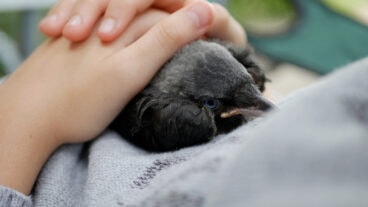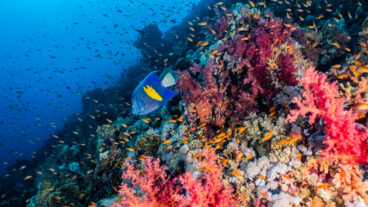Joining the illustrious likes of recent Nobel Peace Prize winner Al Gore, Israeli environmentalist Benjamin Kahn was named this week as one of TIME magazine’s 45 ‘Heroes of the Environment’.
Highlighting the worldwide leaders and visionaries, activists, scientists and innovators, moguls and entrepreneurs, the magazine noted that its chosen “environmental heroes have stepped into the silence, and in doing so, have given the earth a voice. It remains for the rest of us to listen – and join them.”
Thanks to Kahn, that voice has had a resonant effect across Israel. The board chairman of environmental coastline watchdog organization Zalul which he co-founded in 1999, the marine biologist by profession has always been in love with the sea.
As a child, Kahn, known as ‘Benjie’, and his father Morris, a software and telecommunications giant who founded the company Amdocs, would go snorkeling in the Red Sea resort of Eilat, famous for it spectacular coral reef and multicolored tropical fish. His family owns the Underwater Sea Observatory there (along with six other marine aquariums around the world).
The love of diving and the sea stayed with him, and after studying marine biology and living in the US and Australia for a number of years, Kahn returned to Israel in 2000. He was dismayed to discover that the amazing coral reef had drastically deteriorated – the result of years of human contact.
“I knew that if the reef was going to survive, someone had to fight for it,” Kahn told TIME.
According to the magazine, Kahn commissioned his family’s marine-park scientists to come up with new ways of helping the battered coral recover. He started a project in which he and other divers collect reef fragments that have broken off in stormy weather, and then give them to 5,000 school kids to grow like saltwater saplings for months in classroom tubs. Then divers carefully glue the living fragments back onto the reef.
Through Zalul, Kahn has also won a major environmental victory in Eilat. After many years of demonstrations, legal battles, and court decisions, Zalul and other green organizations have forced giant fish farms built in 1997 out of the gulf. These cages were eliminating tons of uneaten food and excrement onto the reef. Following the five-year campaign, the Israeli government passed a resolution in 2005 to gradually force companies to remove them – a third of the cages each year – until 2008.
“When all the cages are gone, maybe the reef can revive itself,” Kahn said. “It’s our only chance to regain the amazing vibrancy the reef once had.”
The Zalul Association for Environmental Protection (zalul is clear in Hebrew) has evolved into a powerful lobby organization – run more like a high tech company than a bunch non-profit tree huggers.
According to its executive director, Yariv Abramovich, the ten-person staff all have a strong business, media or technical background.
“It’s the end of the hippie era in the environmental world,” Abramovich told ISRAEL21c.
The eight-year-old organization has achieved many other victories in its campaigns regarding Israel’s coastline and marine life, which have had a direct impact on Israel’s young environmental policies as well as on the country’s awareness of the issues.
Chief among them was clearing of waste from the waters surrounding the Kishon River near Haifa. In 2005 , Zalul conducted an investigative report on the river, ‘Contaminated Ground in the Haifa Gulf’, and presented it to the Environment Ministry. As a result, the Israeli Ports Corporation has cleared out 75 tons of sludge from the banks of the Kishon.
“I think the TIME award is a great honor, not only for Benjie and Zalul, but for Israel. Looking at the people on this list, you can see what kind of company he’s in,” said Abramovich. “Green activism is breaking out all over the world, and we’re proud of the work that’s being done. I think being recognized like this can help leverage our work here even more.”
One of Zalul’s main priorities for the future – as deemed by Kahn and his coral reef project with school children – is to get the youth of Israel involved and aware of the environmental issues at hand.
“The main force comes from the citizens. The younger they are, the better they will do,” said Abramovich.
With a role model like Benjie Kahn to look up to, the next generation of Israeli environmentalists will undoubtedly accomplish a lot.
“Benjie is one of our founders, and his views and vision is what has driven Zalul. The time and effort he’s put into our organization is definitely a big part of our success,” said Abramovich. “Along with his father, the Kahns are a very important added value to the organization. And you can see from the results how effective they’ve been.”












